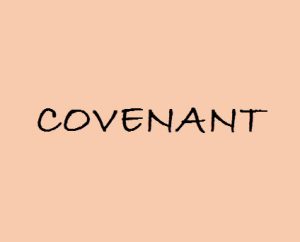Sermon Excerpt
We are a part of the United Church of Christ, a tradition that boldly proclaims “our faith is 2,000 years old but our thinking is not.”This tradition – our denomination – is a network of around 5,000 congregations and nearly 1 million members.
We also claim to be
- a multiracial and multicultural church, and
- a church that emphasizes covenant.
Let me slow down here . . . Before I can even comment on whether or not we have achieved or at least are working toward these ideals, I need to be sure we are on the same page about what they are.
The C-word is one of those churchy words that is often used but rarely explained. Covenant is a biblical term.
This morning’s reading jumps right in the deep end assuming you know about covenant and that this new covenant will shake up your perspective of how God relates to God’s people.
Covenant is an incredibly common concept in the First Testament, which we often call the Hebrew Scriptures. In fact, some scholars go as far as suggesting it is the “single most overriding theme” of the first thirty-nine books of our Bible. In your English language Bible the word covenant appears over 300 times over the course of the First Testament.
Covenant is an important concept in the Second Testament or New Testament as well, although the word doesn’t appear nearly as often. In fact, you will find it in your English language Bible around 30 times and nearly a quarter of those uses will be quotations of passages from the Hebrew Scriptures. It occurs most often in the book of Hebrews, which is one reason I selected this morning’s Scripture passage from among so many options.
In these many experiences of biblical covenant, God covenants or enters into agreements with God’s people. “Covenant is a more comprehensive and less legally defined relationship than a contract.”
Through covenant, God invites God’s people into new relationships with God. By accepting, people become partners with God. By accepting, God self-limits Godself in order to make room for us and to be faithful to the terms of the covenant.
This is just the tip of the iceberg, but should be enough to clue you in to the biblical significance of covenant . . . Jumping ahead a few thousand years to our world, we now rely heavily on this term in the United Church of Christ. Our polity – our system of governance – our unique way of being the church is Congregational. It is one in which we have considerable autonomy as a local congregation to do things our own way yet do so in recognition that we are in covenant with all who comprise our denomination.
Frankly I find myself in far more conversations about our autonomy than covenant. We pride ourselves in having great latitude for how we do ministry and mission here at Fort Myers Congregational UCC. We appreciate that we do not exist in a top down style of being church whereby we have to do something because someone or some group beyond the local church said we must. That is not a part of our story.
Our local autonomy works so well because it exists alongside our covenant. In the United Church of Christ we . . . (read manuscript or listen to message)
So What?
Covenant is a key word in the vocabulary of those who seek to speak Christian. Its frequent appearance in the pages of Scripture and its many contemporary uses in church life speak well of its role. Nonetheless it is a word that isn’t as well understood as its frequent usage might suggest.
- How do you define covenant?
- Give one example of a convenantal relationship you are in and one your congregation is in.
- Bonus: If you are part of the United Church of Christ, how do you understand autonomy and covenant working together at the expression of church we call the local congregation or community of faith?
Note: For more on the entire service of worship in which this sermon was preached, read Prayers for Racial Justice.
